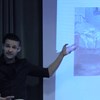bettina

Research and ideas for a brighter future - part 2
What are the greatest challenges to our modern society and what can be done to overcome these, with a brighter future ahead? This is part two of the seminar "Research and ideas for a brighter society"

Setting priorities during pandemics
This projects aims to present a framework for making sound decisions in times of pandemics - when experience and time is scarce, and uncertainties are many.
David Grusky: Should scholars own data? The high cost of neoliberal qualitative scholarship
Welcome to this seminar with David Grusky, Professor of Sociology at Stanford University.The seminar is jointly organized by the Institute for Analytical Sociology and the Institute for Futures Studies.D Thursday, October 6 13:00-15:00 (CET) At the Institute for Futures Studies (Holländargatan 13, Stockholm), or onlineIf qualitative work were to be rebuilt around open science principles of transparency and reproducibility, what types of institutional reforms are needed? It’s not enough to mimic open science movements within the quantitative field by focusing on problems of data archiving and reanalysis. The more fundamental problem is a legal-institutional one: The field has cut off the development of transparent, reproducible, and cumulative qualitative research by betting on a legal-institutional model in which qualitative scholars are incentivized to collect data by giving them ownership rights over them. This neoliberal model of privatized qualitative research has cut off the development of public-use data sets of the sort that have long been available for quantitative data. If a public-use form of qualitative research were supported, it would not only make qualitative research more open (i.e., transparent, reproducible, cumulative) but would also expand its reach by supporting new uses. The American Voices Project – the first nationally-representative open qualitative data set in the US – is a radical test of this hypothesis. It is currently being used to validate (or challenge!) some of the most famous findings coming out of conventional “closed” qualitative research, to serve as an “early warning system” to detect new crises and developments in the U.S., to build new approaches to taking on poverty, the racial wealth gap, and other inequities, and to monitor public opinion in ways far more revealing than conventional forced-choice surveys. The purpose of this talk is to discuss the promise – and pitfalls – of this new open-science form of qualitative research as well as opportunities to institutionalize it across the world.

Should Scholars Own Data? David Grusky About the American Voices Project
If qualitative work were to be rebuilt around open science principles of transparency and reproducibility, what types of institutional reforms are needed? It’s not enough to mimic open science movemen
Tax Setting and Electoral Accountability with Policy-Motivated Politicians
Professor Eva Mörk, Department of economics, Uppsala University Seminars host is Stefan Svallfors. The seminars are free of charge and take place at 13.00–14.30 in the Institute’s seminar room at Hollä
Stateless Studies in an Age of Artificial Intelligence Challenges, Opportunities & Setting a Future Agenda
Statelessness & Citizenship Review, 2025. From the conclusion We are at a pivotal moment where statelessness studies must engage with research and advocacy on the impact of AI on the field, as well a
‘Humans think outside the pixels’ – Radiologists’ perceptions of using artificial intelligence for breast cancer detection in mammography screening in a clinical setting
Health Informatics Journal Abstract This study aimed to explore radiologists’ views on using an artificial intelligence (AI) tool named ScreenTrustCAD with Philips equipment) as a diagnostic decision su

Data-driven innovation i welfare services and public priority setting with Karim Jebari
Presentation from the workshop "AI and autonomous decision making" at the Institute for Futures Studies in Stockholm, October 2017.
Pandemic Ethics Workshop
The Institute for Futures Studies (IFFS) and the Stockholm Centre for Healthcare Ethics (CHE) are organizing a workshop on ethical issues related to pandemics. Are you interested in attending? Get in or Greg Bognar.
Persson's merely possible persons
in: Utilitas 32 (4): 1-9 (2020) Abstract:All else being equal, creating a miserable person makes the world worse, and creating an ecstatic person makes it better. Such claims are easily justified if it








